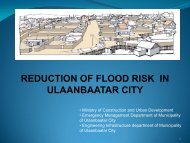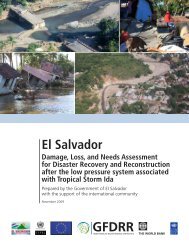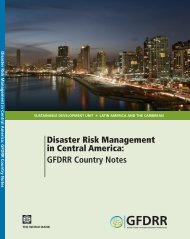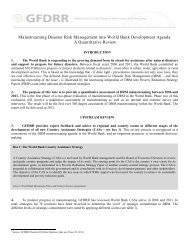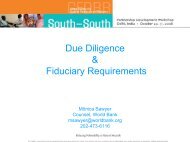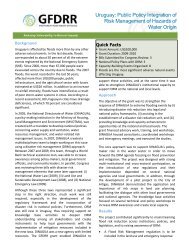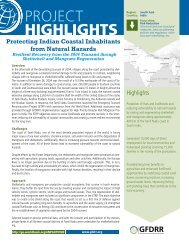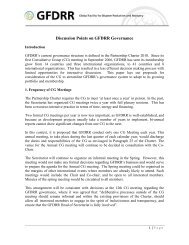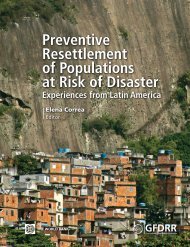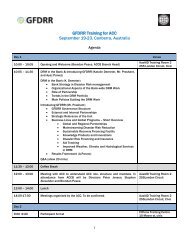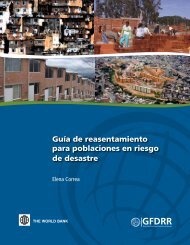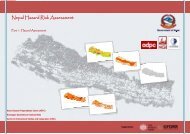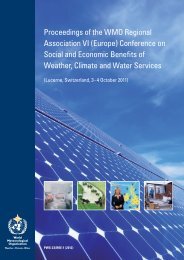Haiti Earthquake Reconstruction Knowledge Notes from ... - GFDRR
Haiti Earthquake Reconstruction Knowledge Notes from ... - GFDRR
Haiti Earthquake Reconstruction Knowledge Notes from ... - GFDRR
Create successful ePaper yourself
Turn your PDF publications into a flip-book with our unique Google optimized e-Paper software.
32 | <strong>Haiti</strong> <strong>Earthquake</strong> <strong>Reconstruction</strong><br />
| 32<br />
to live in the home of a distant relative or stranger,<br />
with the hope that they will have better access to<br />
food and education. Two-thirds of restaveks are<br />
girls; many are forced to work as domestic servants<br />
and are prone to abuse. While some run away,<br />
others are evicted by their host families because,<br />
according to <strong>Haiti</strong>an law, children must be paid for<br />
their services when they turn 15 years old. Nongovernmental<br />
organizations have set up centers<br />
to work with these street children. With the destructions<br />
of the centers, the children likely have<br />
returned to the streets. These children will need<br />
special support.<br />
IN THE MEDIUM TERM:<br />
UNDERSTANDING DIFFERENT<br />
VULNERABILITIES AND CAPACITIES<br />
After a disaster and during recovery, lack of<br />
data can impede equitable distribution of assistance.<br />
A number of factors contribute to the<br />
particular vulnerability of women before, during,<br />
and after a disaster: lack of information about<br />
shelter options, limited literacy (a factor in <strong>Haiti</strong>),<br />
culturally restricted mobility, and responsibilities<br />
to care for the young and the elderly. Entitlement<br />
programs have traditionally favored men, tenants<br />
of record, bank-account holders, and perceived<br />
heads of households, that is to say, not women.<br />
The Damage Assessment could help ensure equity<br />
by disaggregating mortality and morbidity by gender<br />
and age, and take into account losses suffered<br />
in the informal sector.<br />
Past experience stresses the importance of<br />
assessing women’s vulnerabilities separately<br />
due to the potential for vulnerability differences<br />
and the relationship between these differences<br />
and a number of cultural and social factors. It is<br />
helpful to set up special desks at aid distribution<br />
centers for women, girls, and other vulnerable<br />
groups. Special attention should be paid to children’s<br />
inheritance rights to land and property as<br />
well as to the administration of these rights by legal<br />
guardians.<br />
<strong>Reconstruction</strong> programs need to try to preserve<br />
social networks and find ways to lower<br />
the workload of women. Women generally provide<br />
the care for children, the elderly, and the disabled<br />
and carry out demanding household tasks<br />
like the provision of water and wood for fuel.<br />
Not only do disasters increase the intensity of this<br />
work, they also disband informal networks among<br />
extended family and neighbors. In times of crisis,<br />
these very networks have proven to be important<br />
coping mechanisms for women. Thus, the 2003<br />
reconstruction project in Zambia allocated budget<br />
to gainfully employ older women vis-à-vis childcare<br />
and, significantly, to re-establish support networks.<br />
Women constitute 75 percent of the informal<br />
sector, which comprises 85 percent of the <strong>Haiti</strong>an<br />
economy. For women, therefore, the loss<br />
of housing often means the loss of workplace,<br />
tools, supplies, and markets. Agricultural production<br />
is often produced in the garden by women<br />
and traded in the marketplace for other essentials<br />
not produced by the household or manufactured;<br />
it provides the income with which women feed<br />
and care for their children. The formal recognition<br />
of women’s agricultural activities and compensation<br />
for their loss of tools and agricultural inputs<br />
would be highly significant in <strong>Haiti</strong>.<br />
Restoring records of property rights to housing,<br />
commercial property, and land should be<br />
launched as soon as possible, with special assistance<br />
to the poor, squatters, widows, and<br />
orphans. Establishing a multi disciplinary Land<br />
Task Force has worked in other cases to protect<br />
land and inheritance rights, as well as land to resolve<br />
disputes.<br />
ESTABLISHING LONG-TERM<br />
OPPORTUNITIES FOR WOMEN<br />
AND COMMUNITIES<br />
The promotion of gender equity can often be<br />
addressed easily and speedily in the recovery



